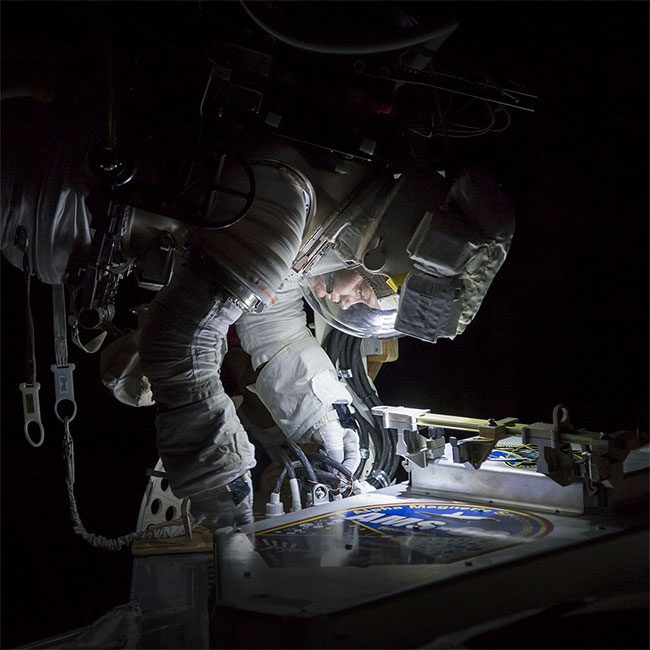In the vast universe, astronauts traveling in space face unprecedented challenges and dangers. As humanity explores deeper into the cosmos, we must also gain a better understanding of maintaining the safety and health of astronauts.
Why Can’t Astronauts Drink Coffee or Tea in Space?
With the continuous development of aerospace technology, space travel has become a reality. However, the life of astronauts in space is not as free as it is on Earth.
They need to adapt to various environments and conditions, and one of those limitations is the strict control of their diet. Therefore, astronauts often cannot drink coffee, tea, and many other popular beverages found on Earth.
The microgravity environment during spaceflight is a crucial factor to consider. On Earth, when we pour water, gravity causes it to flow into a cup. However, in space, without gravitational force, liquids are difficult to contain in a specific position.

Astronauts face many unique dietary challenges in space. (Photo: ABC News)
When astronauts attempt to drink coffee or tea, the liquid tends to float around in the cup, forming small bubbles or droplets instead of settling at the bottom. This not only creates difficulties while drinking but also risks the liquid floating around inside the spacecraft, potentially damaging equipment and electronics.
Limited Water Resources in Space
In space travel, water is a scarce and precious resource. Due to the weight constraints of the spacecraft, the amount of water onboard is also limited. Therefore, astronauts need to maintain their water consumption at a minimum to sustain long-duration missions.
Drinking coffee or tea increases water consumption, while the chemicals in caffeine and tea leaves also lead to water waste. To keep astronauts healthy and conserve water resources, space agencies often restrict these habits.
Caffeine is a stimulant that affects the central nervous system and enhances alertness. While caffeine can boost alertness and alleviate fatigue on Earth, astronauts’ daily activities and circadian rhythms are often significantly disrupted during spaceflight.
Living in space without a day and night cycle for extended periods can negatively impact an astronaut’s biological clock. If astronauts consume caffeinated beverages in such circumstances, their biological clock may become even more disrupted, potentially leading to other issues such as sleep disorders and declining mental health.

Space missions are prolonged and require food to be stored and transported to the space station. Therefore, to ensure the health and nutritional needs of astronauts in space, they must follow a special liquid diet. (Photo: ABC News)
The lack of gravity in the space environment, limited water supply, and the negative effects of caffeine are the main reasons why astronauts limit their consumption of these beverages.
However, scientists continue to strive to find alternative solutions to quench astronauts’ thirst and improve their mental state. In the future, there may be liquid beverages that are more suitable for the space environment, which would be an exciting development.
What Dangers Do These Beverages Pose to Astronauts’ Bodies?
In space, astronauts spend most of their time in a weightless state, which means their bone mass decreases. However, these beverages often contain high levels of sugar and caffeine; excessive consumption can increase the risk of osteoporosis.

Excessive sugar from drinks can lead to insufficient calcium absorption, increasing the risk of osteoporosis. (Photo: NASA).
These beverages often contain many additives and artificial colors that could pose potential health risks to astronauts. Studies have shown that some additives can cause allergic reactions, digestive issues, and other health problems. Artificial colors are also linked to behavioral issues and learning difficulties.
While caffeine can provide alertness and focus in the short term, consuming large amounts of caffeinated beverages over time can lead to dependence and the risk of caffeine toxicity. Astronauts need to remain alert and highly focused, but excessive caffeine intake is not a wise choice as it can lead to sleep disturbances and physical side effects.
Research has shown a connection between high sugar intake and obesity, diabetes, and cardiovascular disease. While in space, astronauts need to maintain good health and stable blood sugar levels to ensure optimal performance under extreme conditions. Therefore, excessive sugar consumption can increase the risk of these chronic diseases.
Additionally, the acidity of tea and coffee can harm astronauts’ teeth. The acid content in these beverages can erode tooth enamel, leading to tooth loss, cavities, and other oral health issues.


















































